Ranking the greatest 75 NBA players of all time: Nos. 50-26
A little more than 4,500 players have appeared in at least one NBA game. In addition, 236 players have made All-NBA teams and 437 players have made All-Star teams, according to basketball-reference.com.
So imagine the task of trying to whittle that list down to the 75 best. That’s what we’re doing. With the NBA celebrating its 75th anniversary this season, USA TODAY assembled a panel of NBA experts to rank the greatest 75 NBA players of all time.
THE LIST: Ranking the greatest 75 NBA players of all time: Nos. 75-51
THE LIST: Ranking the greatest 75 NBA players of all time: Counting down to 1
The panel consisted of Jeff Zillgitt and Mark Medina, Nancy Armour, Dan Wolken, Matt Eppers, Larry Starks and Larry Berger of USA TODAY; Duane Rankin of the Arizona Republic; Jim Owczarski of the Milwaukee Journal Sentinel; Marla Ridenour of the Akron Beacon Journal; Berry Tramel of the Oklahoma City Daily Oklahoman; Evan Barnes of the Memphis Commercial Appeal; Omari Sankofa of the Detroit Free Press; and former USA TODAY NBA writers J Michael and Greg Boeck.
50
Clyde Drexler
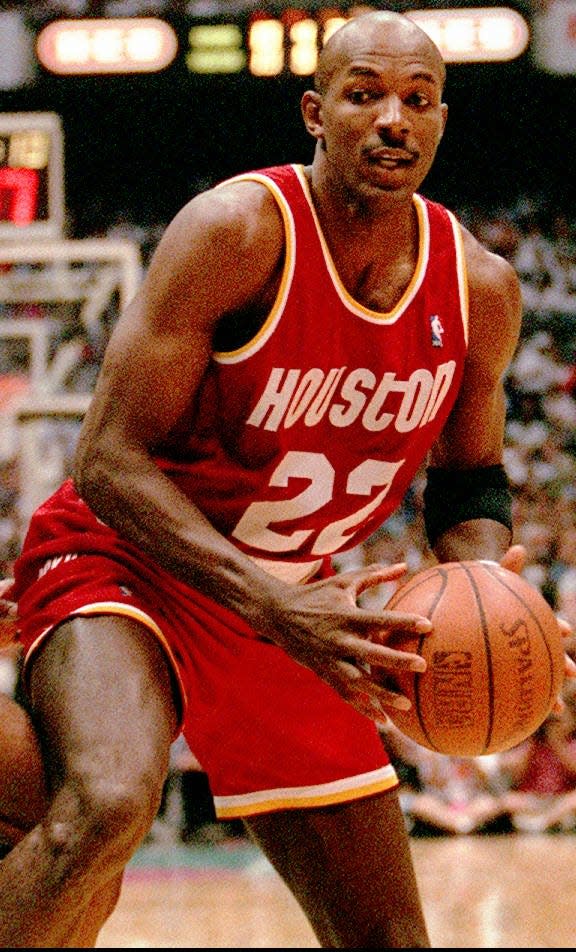
Drexler helped make the Portland Trail Blazers a playoff fixture through most of the 1980s and early 90s as one of the best guards of his era. He led the Blazers to two NBA Finals appearances and remains the franchise’s career leader in games (867), minutes (29,496), points (18,040), field goals (6,889) and steals (1,795). Known as “The Glide” for how he effortlessly rose to the basket, Drexler won a championship in 1995 with the hometown Rockets and made 10 All-Star teams and five All-NBA appearances. He was a member of the 1992 U.S. Olympic Dream Team and is one of six players in league history with 20,000 points, 6,000 rebounds and 6,000 assists.
49
Ray Allen
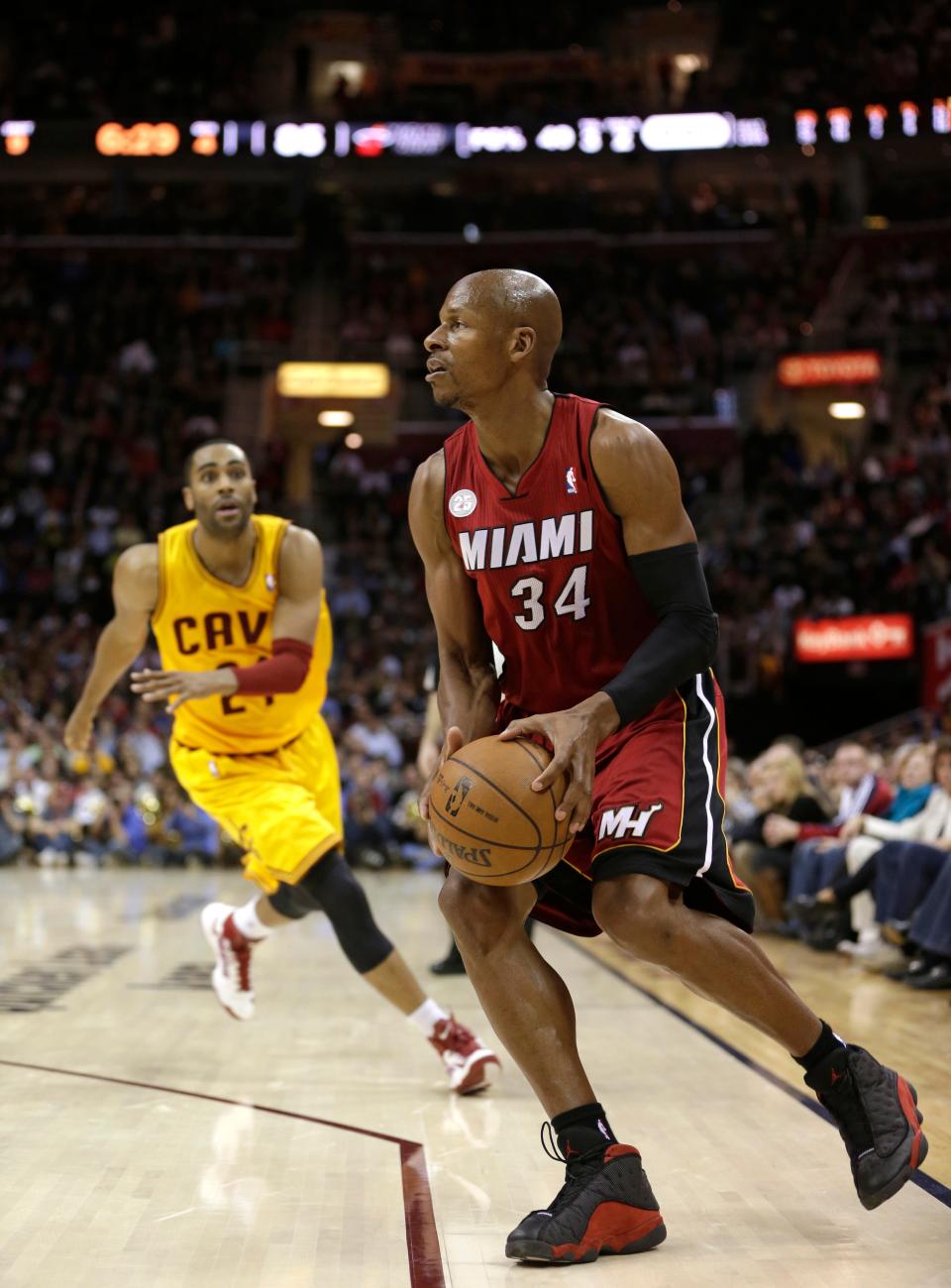
Allen helped usher in this era of 3-point shooting, and he is one of the best to shoot it from long range. Allen made 40% of his 3s over an 18-year career that was marked by his obsessive dedication to fitness and his craft. A two-time All-NBA honoree and 10-time All-Star, Allen won two championships – one with Boston and one with Miami. His backpedaling corner 3 against San Antonio in the final seconds of regulation in Game 6 of the 2013 NBA Finals to force overtime is one of the greatest shots in Finals history. The Heat won the game and then captured Game 7.
48
Reggie Miller
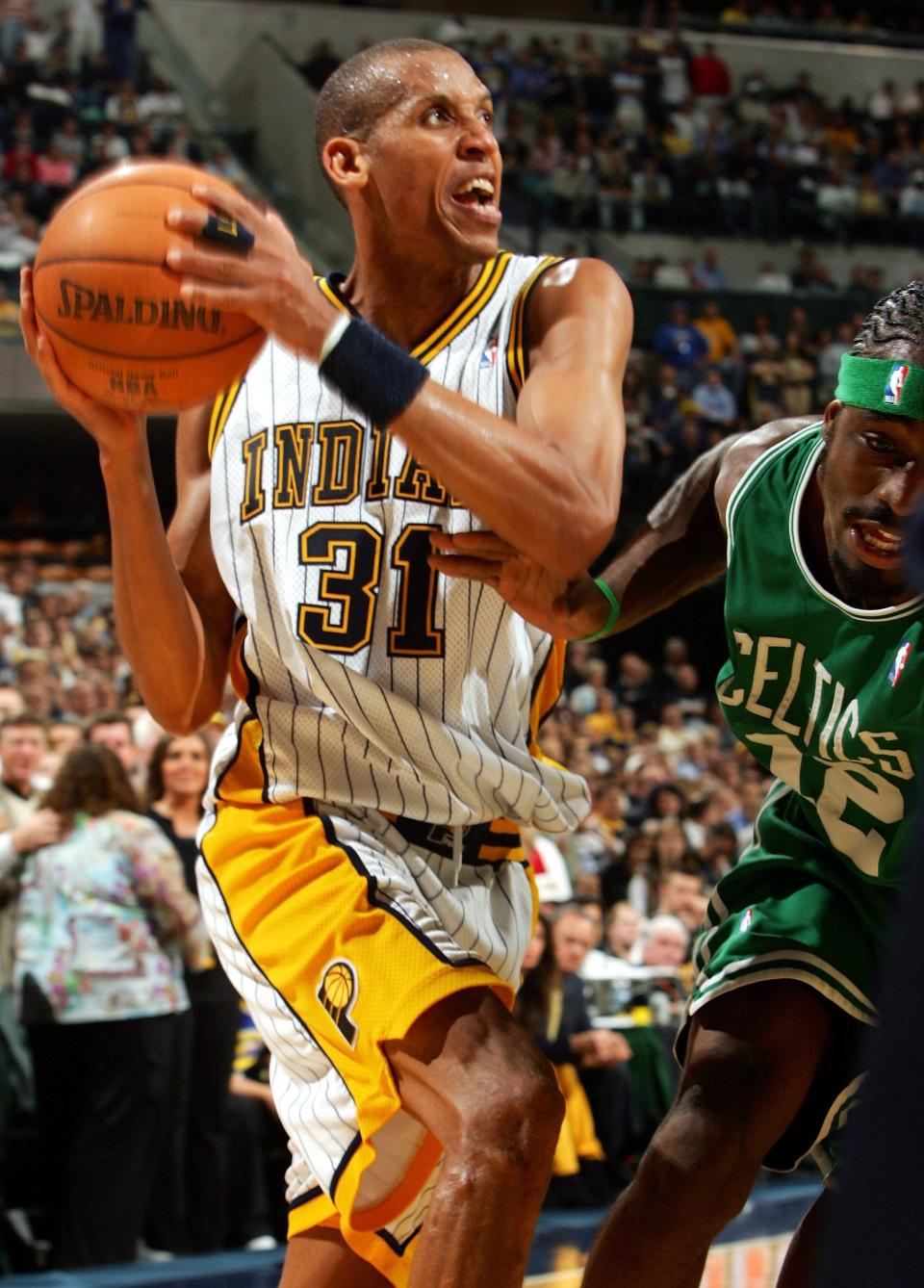
Miller became the face of the Indiana Pacers and one of the greatest shooters in NBA history over 18 seasons in which he was a five-time All-Star and scored 25,279 points (21st all-time). Miller’s most indelible moments came in mid-90s playoff battles against the New York Knicks at Madison Square Garden. He scored 25 points in the fourth quarter of Game 5 in the 1994 Eastern Conference finals to rally the Pacers, famously wrapping his hands around his neck to tell Knicks super fan Spike Lee that his team was choking. Miller then cemented his legend with eight points in the final nine seconds to win Game 1 of the 1995 East semifinals at the Garden.
47
Dominique Wilkins

Wilkins was one of the best dunkers in NBA history, known as the “Human Highlight Film” and winner of two NBA Slam Dunk Contests. Wilkins could do much more than dunk, though, becoming one of the game’s great scorers and one of the league’s marquee players throughout the 1980s and early 90s with the Atlanta Hawks. He was a nine-time All-Star, a seven-time All-NBA selection and averaged at least 25 points for 10 consecutive seasons from 1984-85 to 1993-94. Wilkins averaged 30.3 points in 1985-86 to win the scoring title and is 14th all-time with 26,668 points.
46
Gary Payton
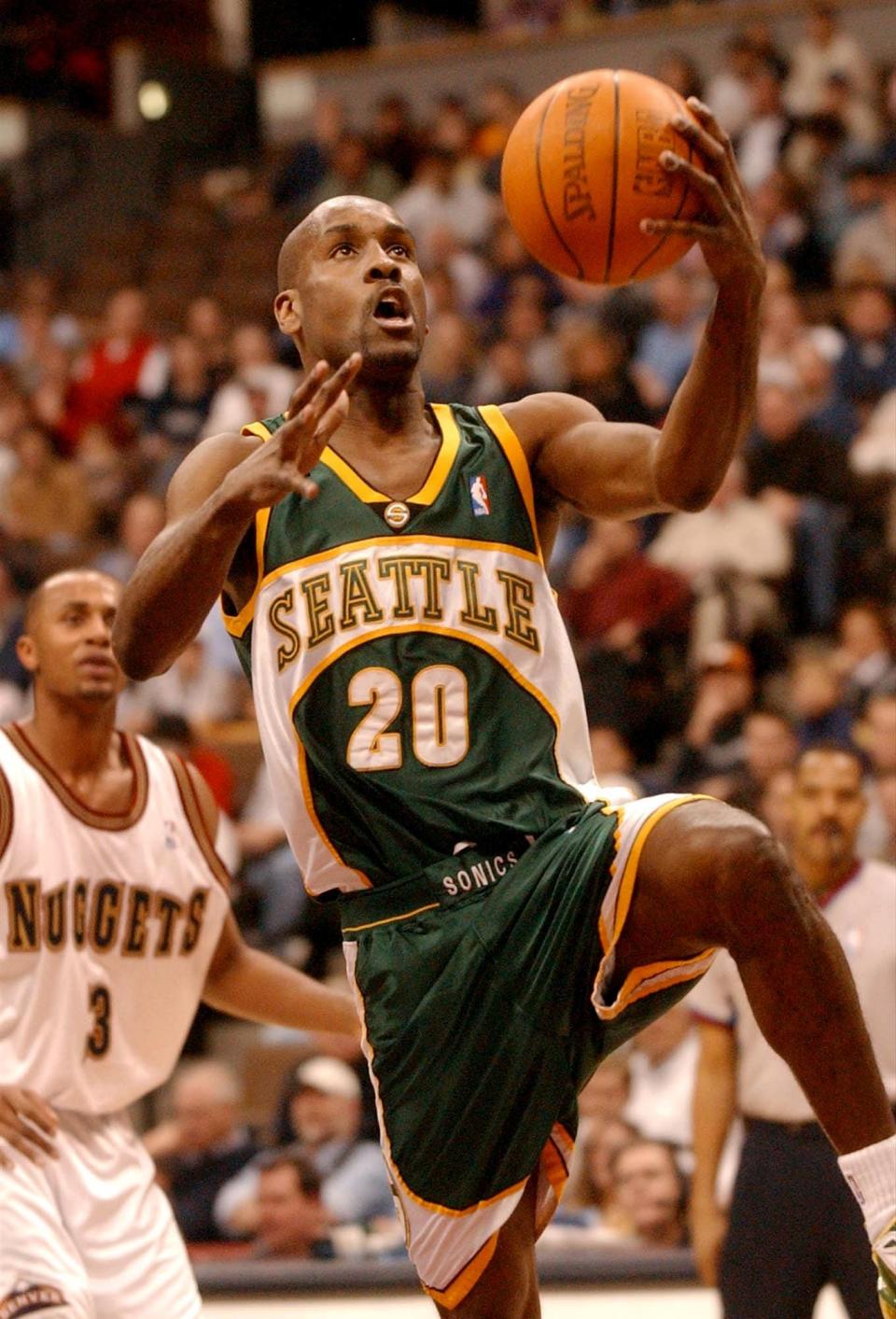
Payton certainly earned his reputation for trash talk during his 17-year career, but he had the game to back it up as one of the NBA’s great all-around point guards. Known as “The Glove” for his tenacious defense, Payton is the only point guard to ever win Defensive Player of the Year (1996) and made the All-Defensive First Team a record-tying nine times. He could score and distribute, too, and was a nine-time All-Star and nine-time All-NBA pick. Payton paired with Shawn Kemp to make the Seattle SuperSonics perennial contenders in the Western Conference, leading them to the NBA Finals in 1996. He later won a championship in 2006 with the Miami Heat.
45
Walt Frazier

For 10 years, Frazier led the Knicks to two NBA championships and was a central figure on one of the most beloved teams in New York sports history. A seven-time All-Star, Frazier averaged 19.3 points with the Knicks and led the team in assists for 10 seasons. He was also one of the game’s greatest defensive players, leading him to be included on seven NBA All-Defensive First Teams. He is especially remembered for his inspirational performance in the seventh and deciding game of a thrilling 1970 NBA Finals against the Los Angeles Lakers. Frazier stats: 36 points, 19 assists and five steals. But Frazier’s performance was overshadowed by a teammate who scored just four points in the win. Everyone remembers Willis Reed limping onto the court and credits him for the Knicks win.
44
George Gervin
Gervin wasn’t part of any of the Spurs’ five NBA titles, but his superstar status may have helped the team survive the transition to the NBA in mid 1970s that eventually led to success. Gervin essentially carried the Spurs on his back for almost a decade during the 70s and 80s. His career scoring average of 26.2 points per game is No. 9 on the NBA’s all-time list. Gervin, who’s “Iceman” poster in the 1970s was once voted as the No. 1 sports poster of all, averaged at least 25.9 points in seven of his nine seasons with the Spurs. His best season of 33.1 points per game in 1979-80 remains a team record. Two seasons later, he averaged 32.3. During his career, Gervin recorded a streak of scoring double figures in 407 consecutive games. He won four NBA scoring titles; only Michael Jordan (10) and Wilt Chamberlain (seven) won more. He played in nine straight NBA All-Star Games. Gervin twice placed second in voting for the regular-season MVP Award.
43
Kevin McHale

Another great power forward in Boston Celtics history, Kevin McHale was a masterful low-post scorer. He had a beautiful up-and-under move that was tough to stop even when opponents knew it was coming. His turnaround jumper and soft baby hook shot left defenders without an answer. It helped that McHale had a quick and decisive release. He was also a solid rebounder who had a gift for offensive rebounds. McHale, who won three titles with the Celtics, was a seven-time All-Star, 1986-87 All-NBA selection, six-time All-Defense selection, two-time Sixth Man of the Year. For his career, he averaged 17.9 points and 7.3 rebounds and shot 55.4% from the field, including 26.1 points, 9.9 rebounds and 60.4% from the field in 1986-87.
42
Bob Cousy
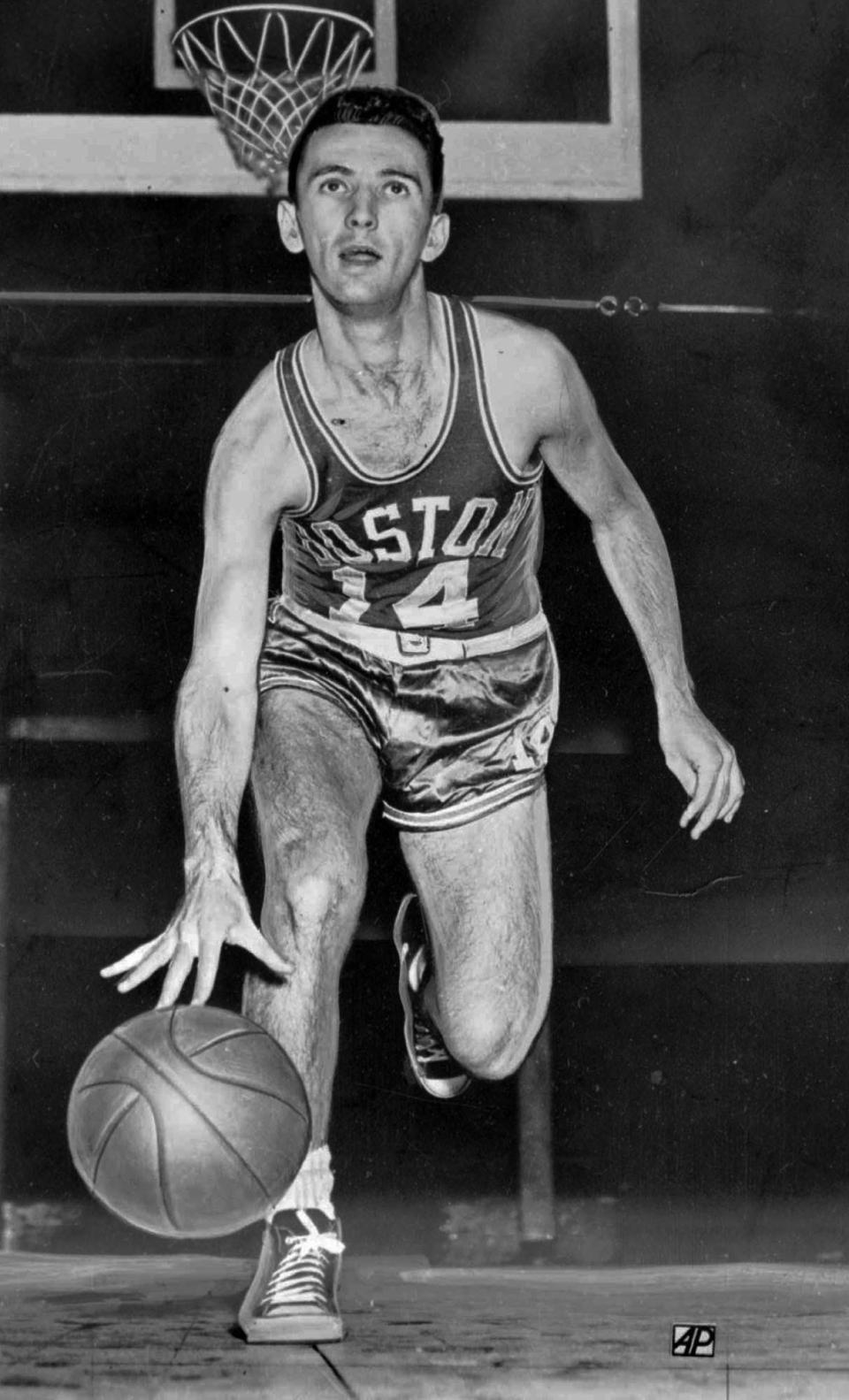
Considered the NBA’s first great point guard, Cousy helped transform basketball from a static game based on two-handed set shots into the more free-flowing, up-tempo game we know today. He entered the NBA in 1950-51 and was an All-Star in each of his 13 seasons with the Boston Celtics, helping establish the league’s greatest dynasty with blend of flashy ballhandling and slick passes rarely seen before. Cousy was the 1957 MVP, made 12 All-NBA teams, led the league in assists eight consecutive years (1953-60) and was the catalyst for the first six championships during the Celtics’ legendary run of dominance in the 1950s and 60s.
40 (tie)
James Harden
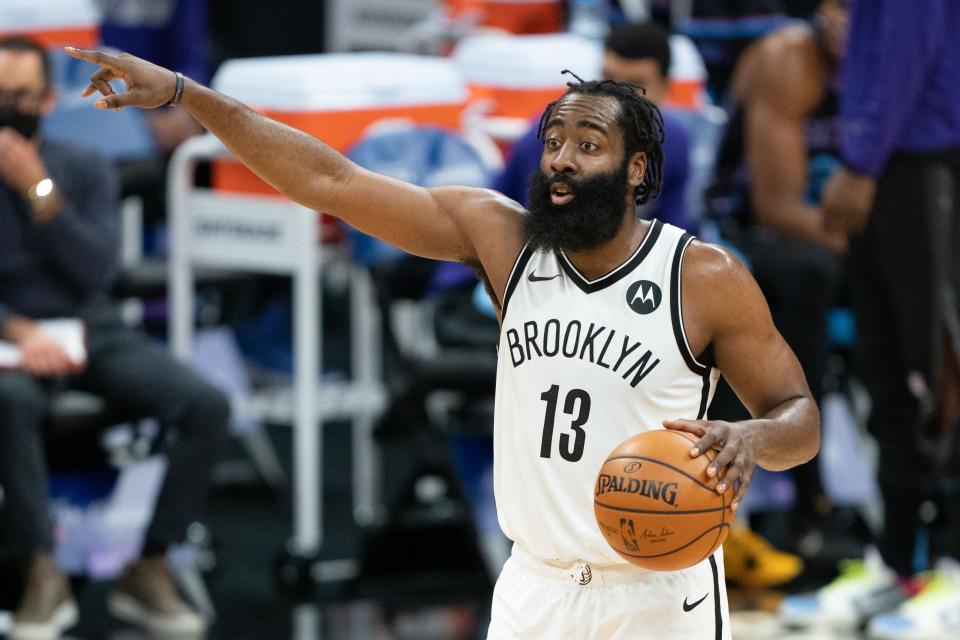
The man with perhaps the most recognizable beard in NBA history, Harden began his career as a star role player and Sixth Man of the Year before blossoming into one of the most prolific scorers of his generation. After famously being traded from Oklahoma City to Houston, he won the 2018 MVP and was a nine-time All-Star, seven-time All-NBA selection and three-time scoring champion with the Rockets, posting the highest single-season scoring average of anyone other than Wilt Chamberlain or Michael Jordan (36.1 in 2018-19). Harden helped usher in the modern era of 3-point shooting, and now with Brooklyn, he enters his 13th season fifth all-time in 3s made with 2,445.
40 (tie)
Russell Westbrook
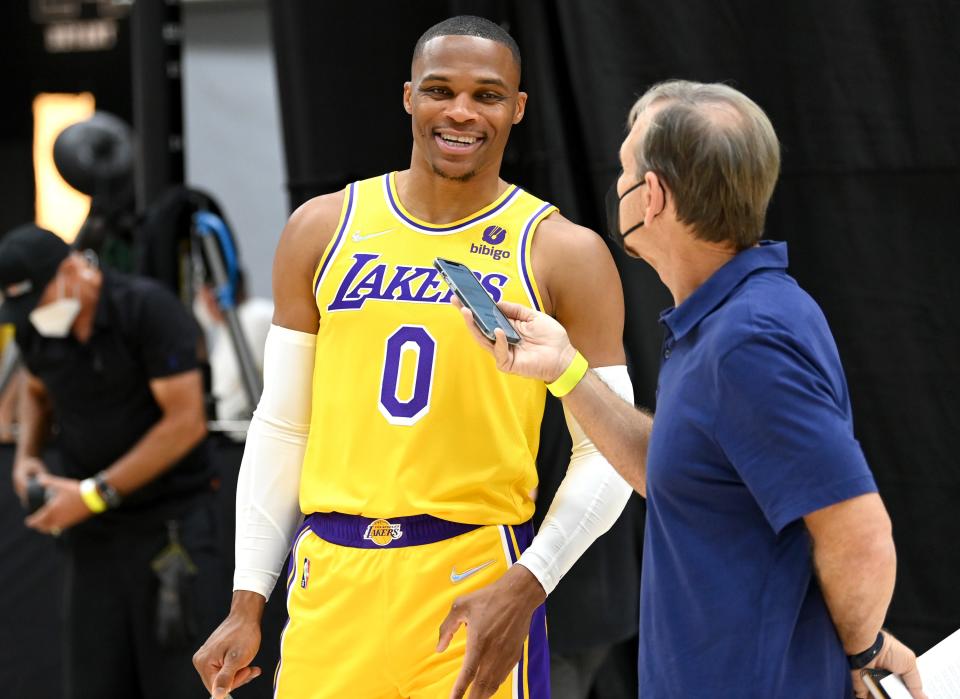
Russell Westbrook is the NBA’s triple-double king with 184, passing Oscar Robertson in 2020-21. Once Westbrook started amassing triple-doubles, he has barely slowed down with 176 of them coming in the past seven seasons. He has averaged a triple-double four times in his career, including 31.6 points, 10.7 rebounds and 10.4 assists in 2016-17, the season he won MVP. He has led the league in scoring twice, assists three times and made the All-NBA team nine times and All-Star team nine times. Scoring, rebounding and passing at a Hall of Fame rate, Westbrook plays one way: all out.
39
Elvin Hayes
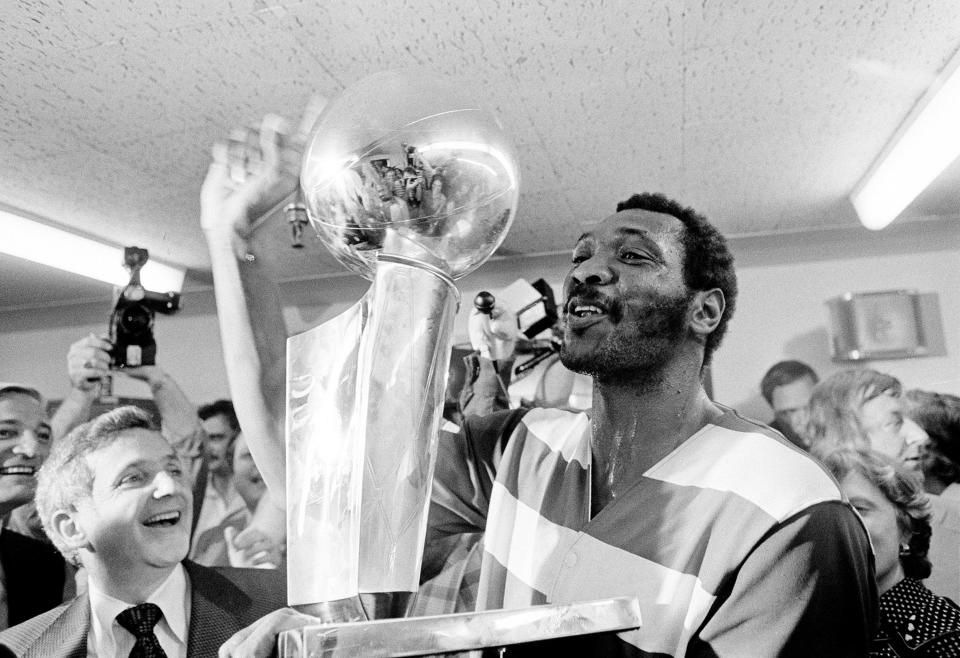
Hayes was the No. 1 pick in the 1968 draft by the San Diego Rockets and made his presence felt immediately, leading the NBA in scoring as a rookie at 28.4 points per game. With his signature turnaround jumper, he was a force in the post for 16 seasons with the Rockets and Baltimore/Washington Bullets franchises. Hayes was a 12-time All-Star and six-time All-NBA selection and paired with Wes Unseld to lead the Bullets to three NBA Finals (1975, 1978, 1979) and the 1978 championship. Consistent and durable, Hayes missed just nine games in his career and is 11th all-time in points (27,313) and fourth in rebounds (16,279).
38
Chris Paul
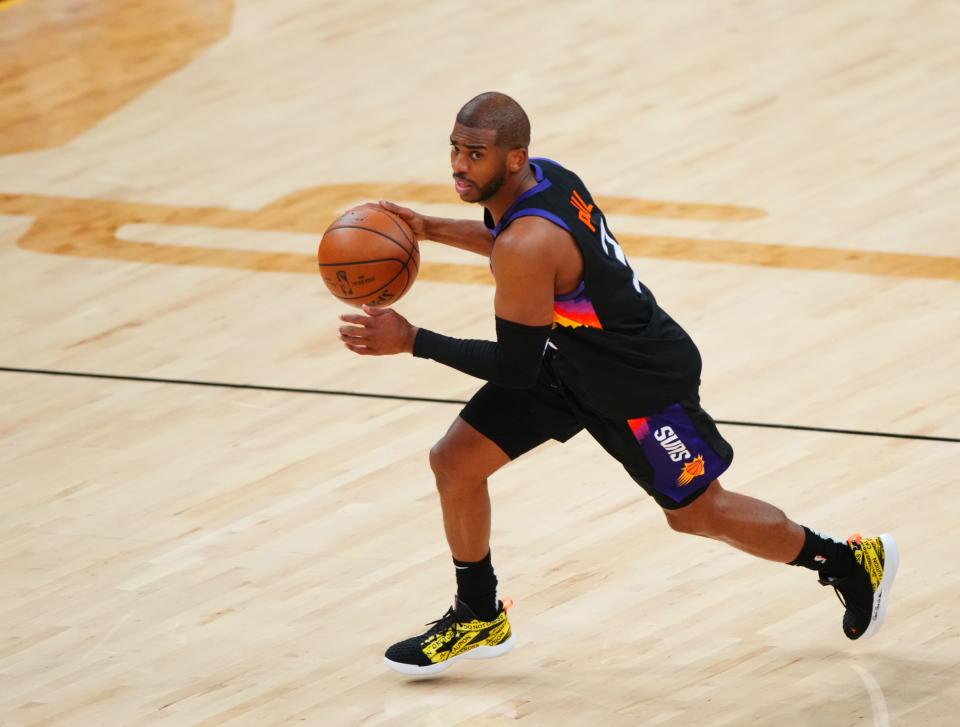
Paul’s greatness is not measured by the number of NBA titles he has won (zero). Instead, it is measured in his fifth-place standing on the NBA’s all-time assists list (10,275). Or on how he made the New Orleans Hornets (2005-2011), Los Angeles Clippers (2011-17), Houston Rockets (2017-19), Oklahoma City Thunder (2019-20) and Phoenix Suns (2020-21) playoff contenders as soon as he joined them. Paul has experienced playoff heartbreak in the NBA Finals (once), Western Conference Finals (once), second round (four) and first round (five). But plenty of those exits had to do with injuries. Through his demanding leadership style, strict regimen and superior playmaking, Paul has consistently made himself and teammates better.
37
Steve Nash

If not for Nash, the current generation of point guards would play much differently. When Nash played for Mike D’Antoni with the Phoenix Suns (2004-2008), the tandem popularized a high-paced offense that put heavier emphasis on outside shooting, pick-and-rolls and positionless players. With a pass-first mentality that landed him in third place on the NBA’s all-time assists list (10,335), Nash played with infectious joy and creativity that empowered his teammates. Yet, Nash also played with grit and an under-dog mentality. His time in Dallas became short lived (1998-2004) amid concerns about his back. But Nash lasted for 18 NBA seasons until injuries eventually caught up to him during his short stint with the L.A. Lakers (2012-2015), albeit much later than expected.
36
Patrick Ewing
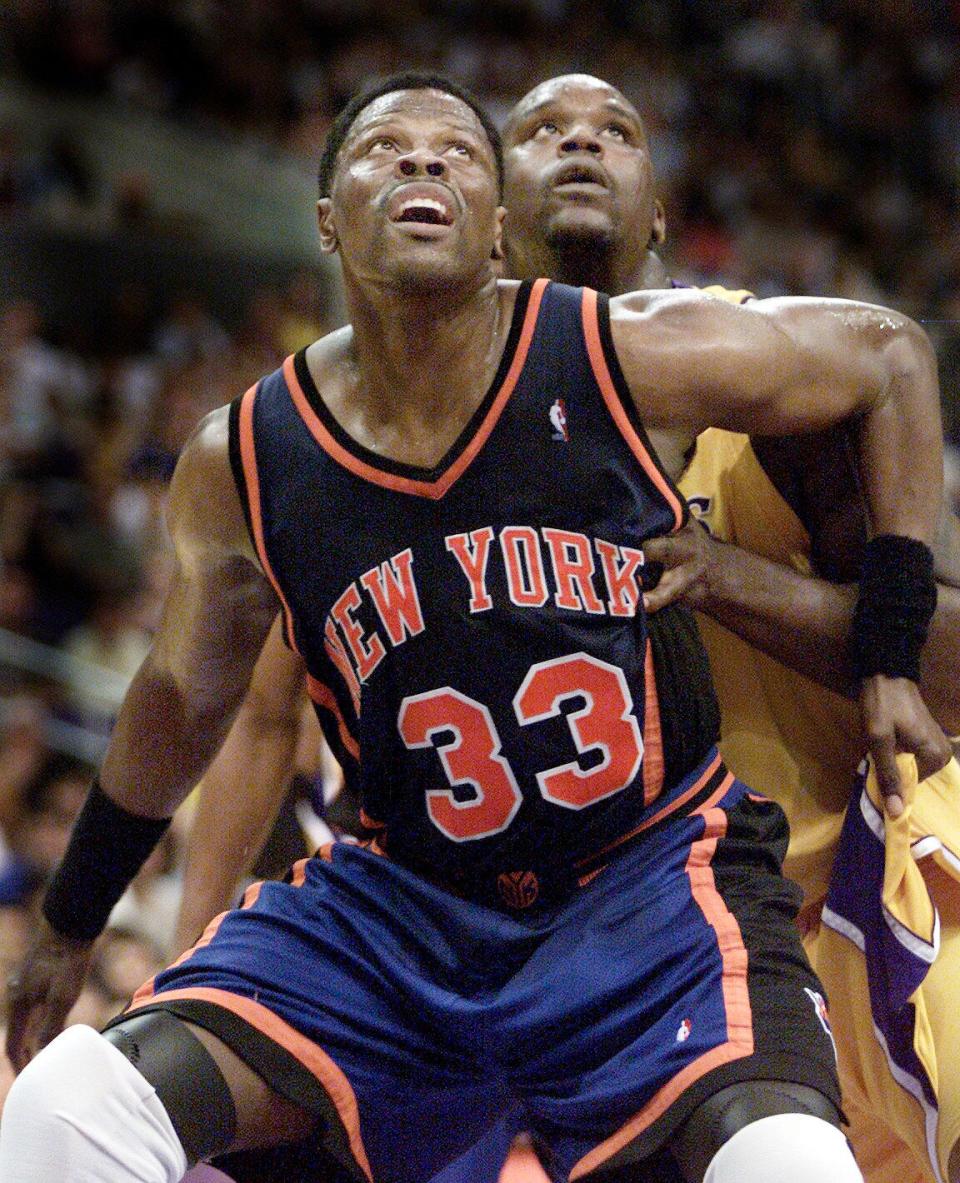
For 15 years, Ewing was the centerpiece of the Knicks. During that time, he was one of the league’s most dominant centers. Ewing finished his NBA career with 24,815 points and 11,607 rebounds in a 17-year career that ended with stops in Seattle and Orlando. It was the Knicks that Ewing made his mark. The 11-time All-Star holds a number of Knicks records, including leading scorer (22.8 points) and leading rebounder (10.4). But the Chicago Bulls -- specifically, Michael Jordan -- often stood in the Knicks way. From 1989 through 1996, Jordan's Bulls eliminated the Knicks five times in the playoffs. When Jordan retired in 1994, Ewing led New York to a 3-2 lead over the Houston Rockets in the NBA Finals before losing in seven games. The Knicks haven’t been nearly the glamorous franchise since he left. With Ewing from 1985 to 2000, they won 668 games and went to the playoffs in 13 of 15 seasons. Without him, they have advanced to the playoffs just six times and advanced past the second round just once.
35
George Mikan
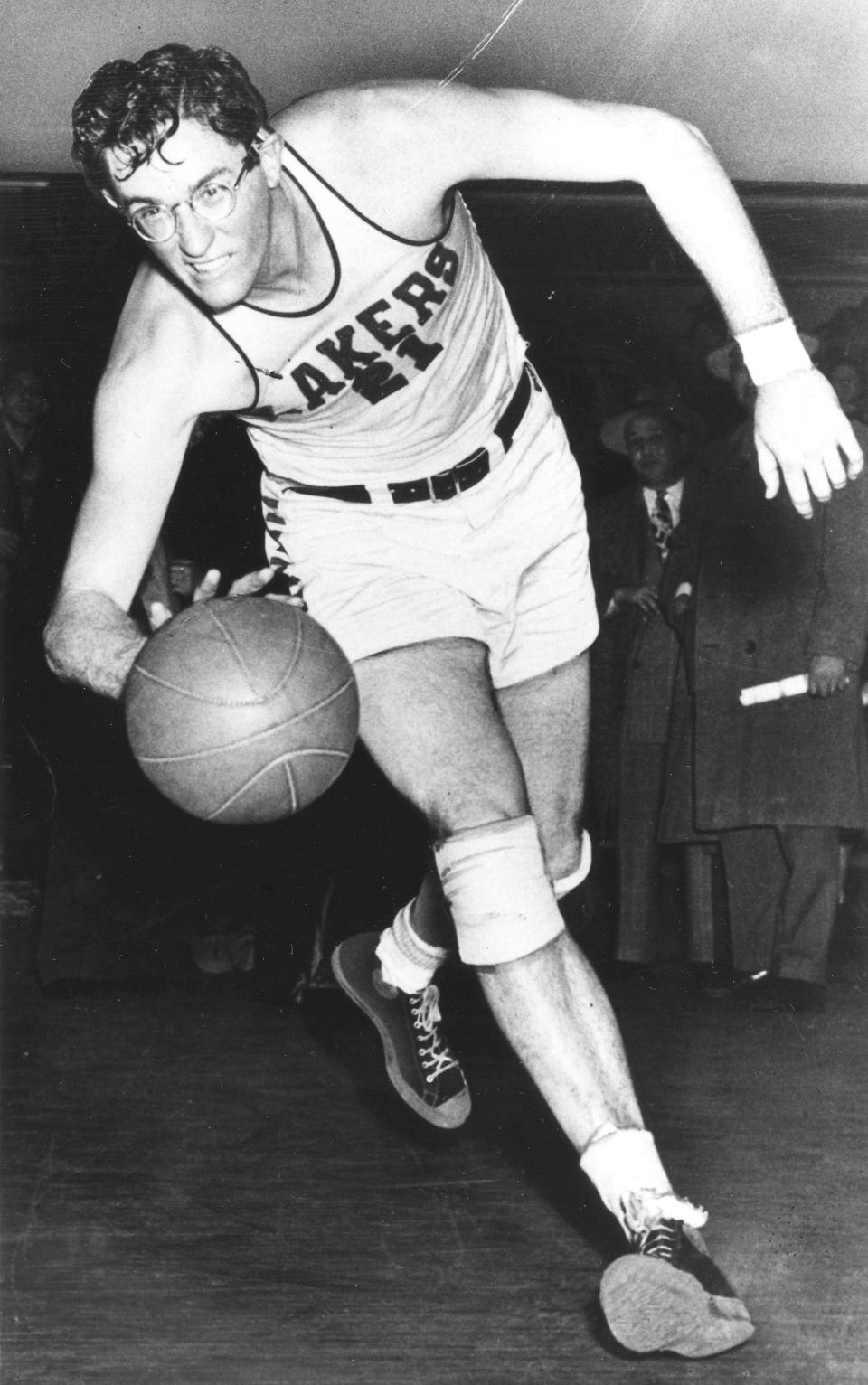
Mikan played just seven NBA seasons but he has received credit with so many positive aspects of the league. Former league commissioner David Stern called him the league’s “first true superstar.” Former Lakers great Bill Sharman said Mikan was the reason the Lakers kept the nickname when they moved to Los Angeles from Minneapolis. (“Mainly because of George Mikan and his reputation and the championships they won, they felt they wanted to keep that name and reputation,” Sharman said.) Former Lakers owner Jerry Buss credited him with “blazing the trail” for such future franchise superstars as Elgin Baylor, Jerry West, Wilt Chamberlain, Kareem Abdul-Jabbar, Magic Johnson, Kobe Bryant and Shaquille O'Neal. Mikan won five NBA titles in the first six years of the franchise’s history, starting a dynasty that has led to an NBA-best 17 titles (tied with the Boston Celtics). He had such an outsized presence in the early days of pro basketball that a Madison Square Garden marquee advertising a Lakers-New York Knicks game once famously read “Geo. Mikan vs. Knicks.” The New York Times wrote that he so captured the public's imagination that the NBA often sent him on the road a day before a game to drum up publicity for his next game.
34
Kawhi Leonard
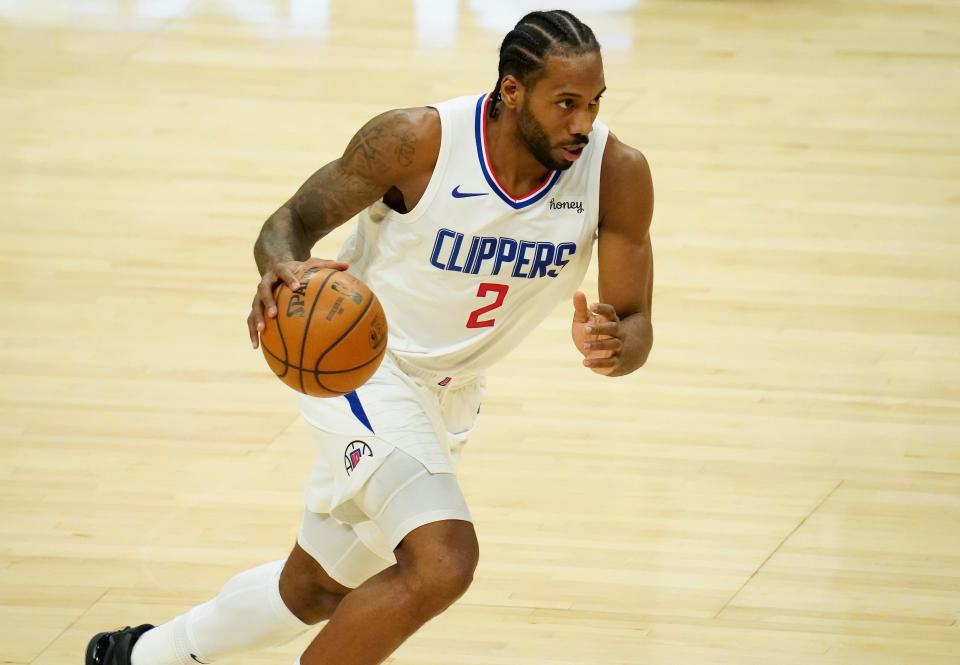
Leonard entered the NBA as an assuming albeit versatile forward that the San Antonio Spurs would groom to carry the franchise after Tim Duncan, Tony Parker and Manu Ginobili retire. Leonard appeared ready after winning his first Finals MVP (2014), Defensive Player of the Year award (2015) and making his first All-Star appearance (2016). But Leonard asked for a trade partly amid frustrations how the franchise handled his left quad injury that sidelined him for all but nine games in the 2017-2018 season. Since then, Leonard won another NBA title and Finals MVP with the Toronto Raptors (2019) before signing with the Los Angeles Clippers.
33
Jason Kidd
With his superb passing and rebounding abilities, Kidd was known for triple-doubles. He remains fourth all-time in triple-doubles (107), but his defensive prowess elevated his game and made him one of the best all-around point guards in NBA history. Kidd, the second overall pick in 1994 out of Cal, shared the Rookie of the Year award with Grant Hill, then went on to 10 All-Star appearances, six All-NBA selections and nine All-Defensive teams. He led the league in assists five times during a 19-year career, finished second all-time in assists (12,091) and steals (2,684) and won the 2011 championship with the Dallas Mavericks.
32
Bob Pettit
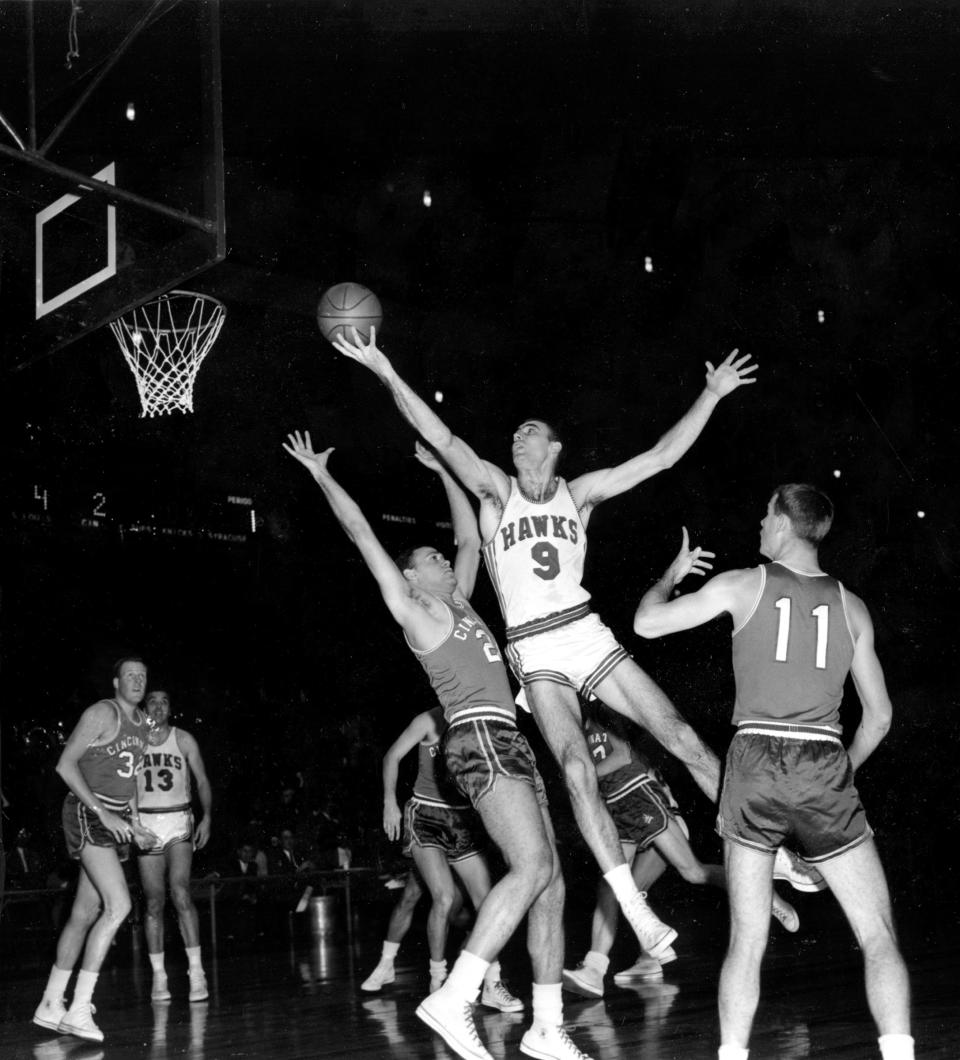
There is little debate that Pettit, playing for the St. Louis Hawks, was the greatest power forward of his era. Is he in the argument as the greatest of all time? Centers and guards were the scorers in his day. Power forwards grabbed boards. Pettit was one of the first to do both extremely well; no power forward in NBA history has better scoring and rebounding averages than Pettit over the course of a career. He never averaged less than 24.6 point per game or 12.4 rebounds per game in a season. When he retired in 1965 as the first player in league history with more than 20,000 points, he had a 26.4 career scoring average and a 16.2 rebound-per-game mark – which remains No. 3 on the all-time career rebounding average list 56 years after he retired. Pettit was a two-time MVP, a four-time All-Star Game MVP and was an all-NBA first-team selection 10 straight years. He led the Hawks to the NBA Finals four times and winning the title over the Boston Celtics – they were missing Bill Russell – in 1958. They lost to Russell’s Celtics in 1957, 1960 and 1961.
31
Rick Barry
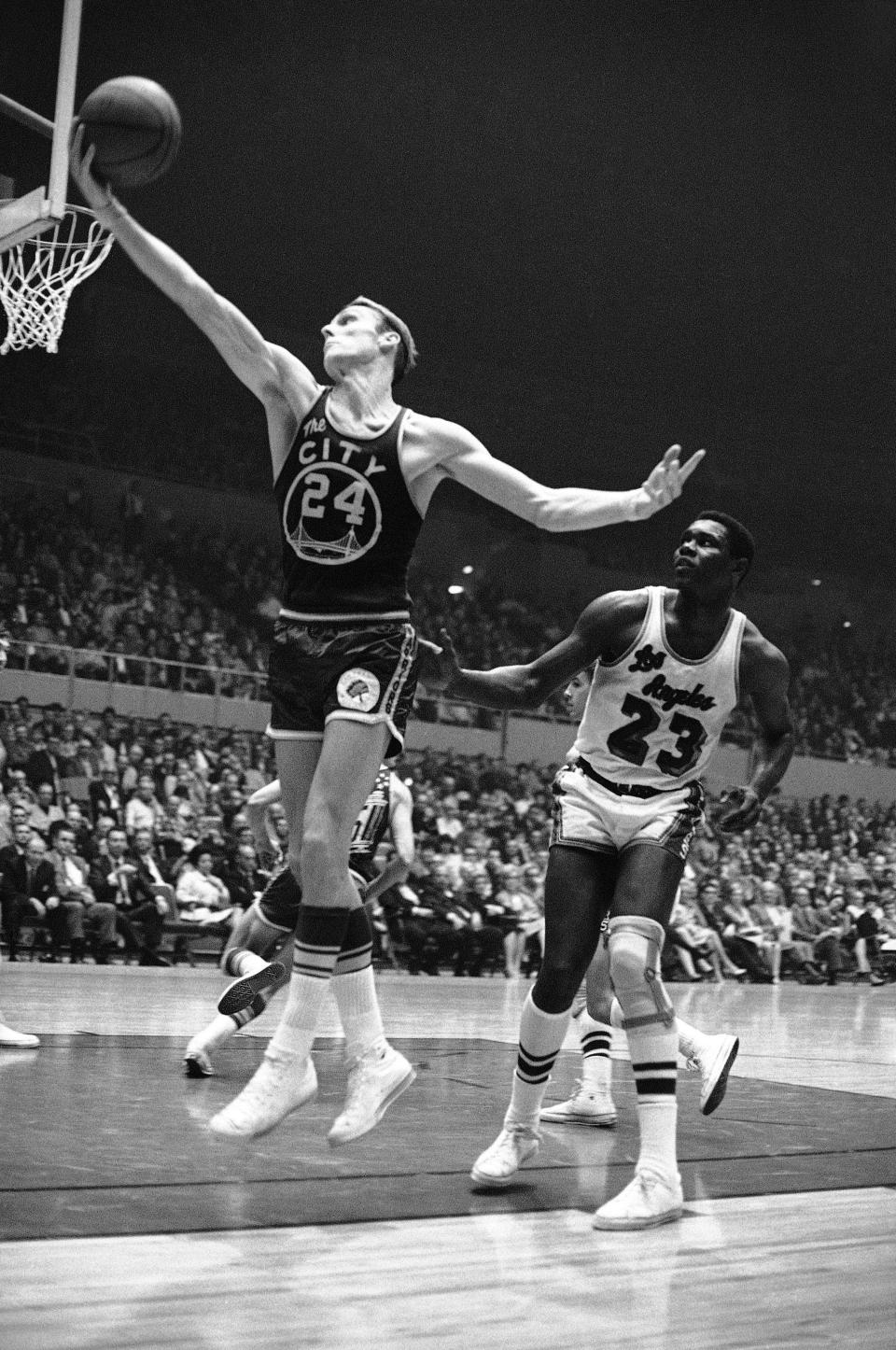
Forget, for a moment, the underhand free throws. Barry had a textbook jump shot – elbow helped form the perfect V – and was a prolific and efficient scorer. Barry started in his pro career in the NBA and then spent four seasons in the ABA, and by the time he returned to the NBA in 1972-73, he was still a scorer. He averaged at least 21 points in his first eight NBA seasons, including 30.6 in 1974-75 when he also averaged 6.2 assists, 5.7 rebounds, a league-best 2.9 steals and league-best 90.4% from the free throw line. Barry averaged 23.2 points and shot 45% from the field in his NBA career. OK, now those free throws. Barry mastered the underhand toss, making 90% of free throws. He was a six-time NBA All-Star, six-time All-NBA performer and 1975 Finals MVP, averaging 29.5 points.
30
Giannis Antetokounmpo
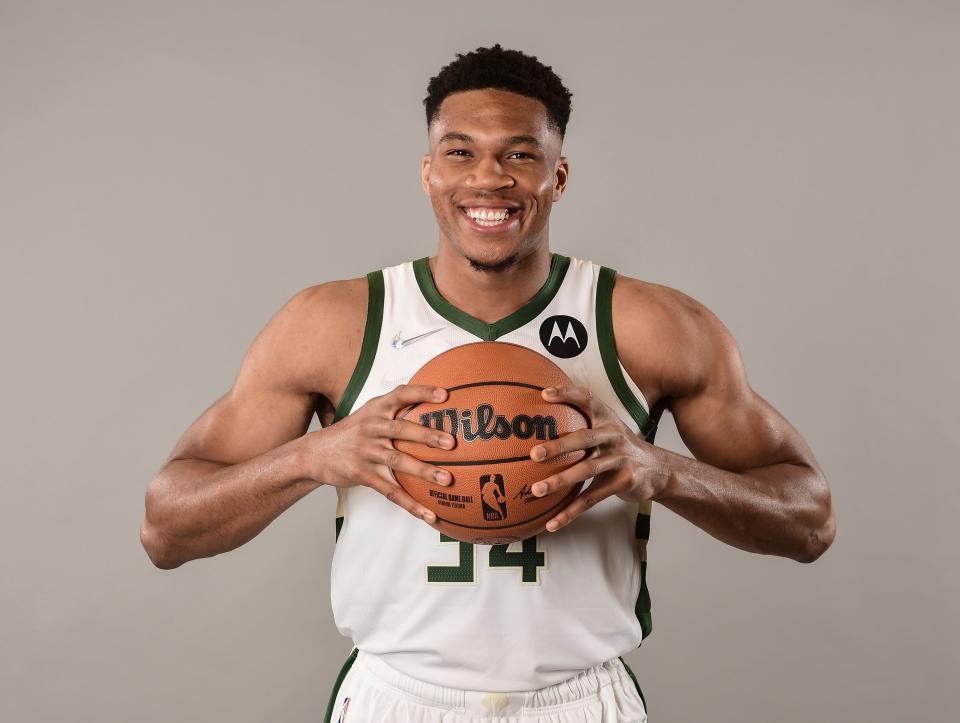
Giannis Antetokounmpo turned into something more than the Milwaukee Bucks, more than anyone expected. With a unique combination of length, quickness and strength that makes him difficult to defend and difficult to score on, Antetokounmpo developed into one of this era’s premier players. Just 26 years old and eight seasons into his career, Antetokounmpo is a two-time MVP, Defensive Player of the Year, five-time All-NBA choice, five-time All-Star and in 2021, he was named All-Star MVP, won the championship and earned Finals MVP. In his second MVP season in 2019-20, he averaged 29.5 points, 13.6 rebounds, 5.6 assists, one steal, one block and shot 55.3% from the field. He was unstoppable in the 2021 Finals, averaging 35.2 points, 13.3 rebounds and five assists while shooting 61.8% from the field.
29
Allen Iverson
Fifty-points in a road game his rookie season. A career-high 60 points midway through his career. Two 50-point games in a playoff series. Iverson brought new meaning to scoring point guard. Using his speed and ball-handling prowess, Iverson freed himself from defenders to get the shots he wanted – at the rim or with jumpers. And Iverson was tough, too, absorbing contact, registering four seasons with at least 10 free throws per game. He averaged 26.7 points and 6.2 assists and shot 45.2% from the field. He led the league in scoring four times, averaging at least 30 points in four seasons, including career-best 33 in 2005-06. He was durable, leading the league in minutes played per game seven times. An 11-time All-Star, seven-time All-NBA performer and 2000-01 MVP, Iverson is No. 25 on the league’s all-time scoring list.
28
Dwyane Wade
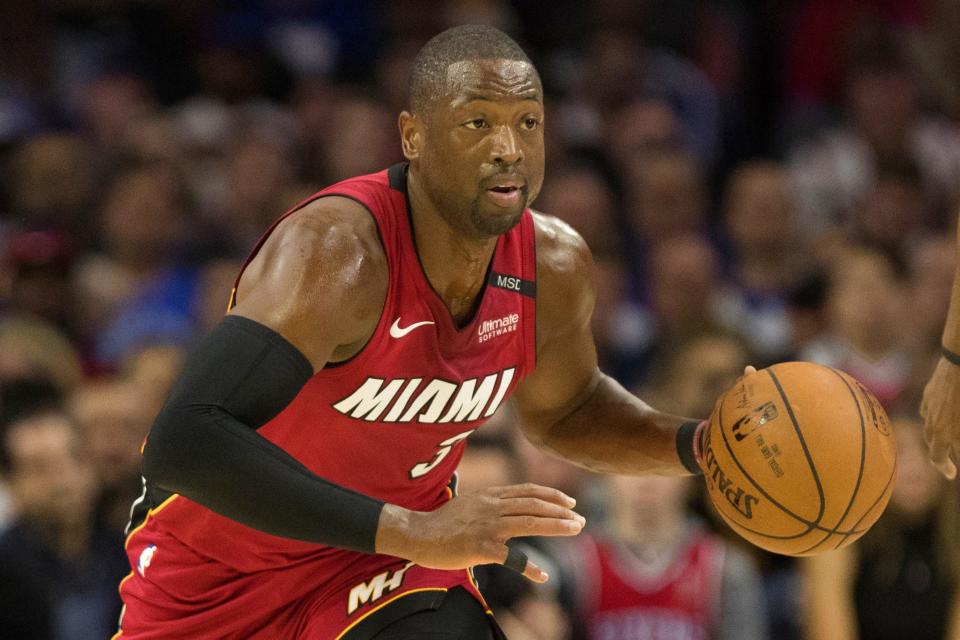
Wade is another star from the 2003 draft class who put himself in the conversation as one of the game’s best two guards. Wade knew how to put the ball in the hoop. He led the league in scoring at 30.2 points per game in 2008-09 and averaged 22 points in his 16-year career. Wade did most of his work inside the 3-point line, shooting 50.2% on 2-point field goals and 76.5% at the foul line. Wade made the All-NBA team eight times, All-Star team 13 times, All-Defensive team three times (Wade holds the records for most blocks by a guard) and won three championships, earning Finals MVP in 2006 when he averaged 34.7 points, 7.8 rebounds and 3.8 assists.
27
John Stockton

John Stockton is the NBA’s all-time leader in assists, and he’s so far ahead, it’s hard to envision anyone in the league today catching him. But before we get into his passing, let’s acknowledge Stockton’s durability – he played in 1,504 games out of possible 1,526. That’s right he missed just 22 games in his 19 year career and played in every regular-season game in 17 of those seasons. Stockton has 15,806 assists, 3,000 more than the next player, Jason Kidd, on the list. A master of the pick-and-roll, he led the league in assists nine consecutive seasons, including 14.5 in 1989-90. He was also a lights-out shooter, making 54.1% of his shots inside the 3-point line. For his career, he averaged 13.1 points, 10.5 assists and 2.2 steals – and he’s No. 1 all-time with 3,265 steals.
26
Kevin Garnett
“Anything’s possible,” Garnett yelled after winning his one and only NBA title with the Boston Celtics in 2008. Those words captured his joy and relief after spending eight of his first 12 seasons with the Minnesota Timberwolves (1996-2008) advancing past the first round only once. That all changed when the Timberwolves dealt Garnett to the Celtics, which allowed him to collect an NBA ring with Ray Allen and Paul Pierce. Garnett’s words also captured his emotional intensity he showed on the court as a fiery defender and demanding teammate. In Boston (2007-2013), Brooklyn (2013-15) and Minnesota again (2014-16), Garnett became one of the best big men of his generation because of his versatile scoring, willing passing, consistent rebounding and intense defense.
This article originally appeared on USA TODAY: Best NBA players of all time: Ranking the Top 75 -- Nos. 50-26

